Business in Cambodia. Cambodian Economy

Cambodian Foreign Trade. Business in Phnom Penh (Cambodia)
- Introduction to the Kingdom of Cambodia (Southeast Asia)
- Cambodian Economy
- Business in Phnom Penh
- Cambodian International Trade
- Sihanoukville Autonomous Port
- Special Economic Zones in Cambodia-Phnom Penh SEZ
- Investment in Cambodia
- Case Study:
- Royal Group - Kith Meng
- Importing into Cambodia
- Business Opportunities in Cambodia:
- Telecommunications
- Garments
- Agribusiness
- Access to the Cambodian Market
- Business Plan for Cambodia
The aims of the subject “Foreign Trade and Business in the Kingdom of Cambodia” are the following:
- To analyze the Cambodian Economy and Global Trade
- To know the trade opportunities in Cambodia
- To explore the Cambodian trade relations with the country of the student
- To know the Cambodian Trade Agreements
- To examine the profile of Cambodian businesspeople and enterprises
- To develop a business plan for the Cambodian Market

The Subject “Foreign Trade and Business in Cambodia” belongs to the following Online Programs taught by EENI Global Business School:
Masters: International Business, Foreign Trade.
Languages:  (
( Camboya
Camboya  Cambodge).
Cambodge).
- Credits of the subject “Doing Business in Cambodia”: 1

- Duration: one week
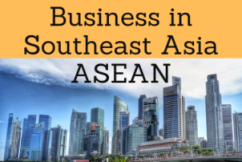
 Masters adapted to Cambodian Students.
Masters adapted to Cambodian Students.
International Trade and Business in Cambodia.

- Nanning-Singapore Corridor
- Access to the East-West Corridor (Myanmar-Vietnam)

Cambodian Trade Agreements and Market Access:
- Cambodia and the Buddhist Economic Area
- ASEAN
- ASEAN Free-Trade Area
- ASEAN Economic Community
- Mekong Economic Cooperation
- Mekong River Commission
- Cambodia has trade agreements (as a member of the ASEAN) with China, India, the EU, Japan, Korea, Russia, and the U.S.
- ASEAN (Cambodia)-Australia-New Zealand (Free-Trade Area)
- GSP
- Regional Comprehensive Economic Association
- Greater Mekong Subregion
- SCO (Dialogue Partner)

- WTO
- GATS
- Agreement on the Application of Sanitary Measures
- Agreement on Technical Barriers to Trade
- Agreement on Preshipment Inspection
- Agreement on Safeguards
- Trade Facilitation Agreement
- BIC (Containers)
- Chicago Convention (ICAO)
- IMO
- WCO
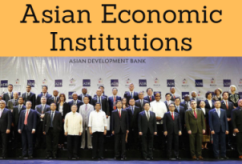
- Asian Development Bank
- Colombo Plan
- Boao Forum for Asia
- Asia Cooperation Dialogue
- ESCAP
- Africa-Asia Strategic Partnership
- Asia-Middle East Dialogue
- FEALAC
Global Organizations. Cambodia is a member of:
- UN
- WB
- WTO
- IMF
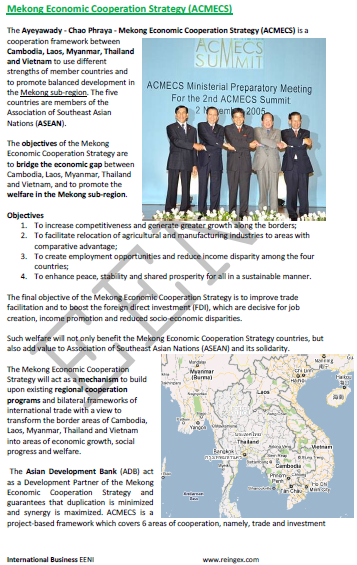
The Kingdom of Cambodia is situated in South-east Asia, sharing borders with Thailand, Laos, and Vietnam.
- 90% of the Cambodian population is Khmer
- The capital, Phnom Penh (2 million people) is the economic and political centre of Cambodia
- Type of Government: Unitary Parliamentary constitutional monarchy
- Monarch of Cambodia: Norodom Sihamoni
- Cambodian Independence: 1953 (from France)
- Cambodian Area: 181,035 km²
- Cambodian population: 15.5 million people
- Official language of Cambodia: Khmer. French is also spoken
Theravada Buddhism is the religion of 95% of the population (38 million).

Cambodia belongs to the Buddhist Civilization
Cambodian Economy.
- Cambodia is a member of the ASEAN since 1998
- Cambodia has accomplished a high economic growth (average of 9.4% annually)
- The Manufacturing production is focused on the garment sector, these products dominate the Cambodian exports, especially to the U.S.
- The Cambodian service sector is strongly concentrated in the commerce activities and catering-related services
- The Royal Government of Cambodia has approved twenty-one Special Economic Zones situated along the border with Thailand and Vietnam (Koh Kong, Poipet, Savet, and Phnom Den), at Sihanoukville and Phnom Penh
- Companies within the Special Economic Zones benefit from some fiscal incentives (revenue tax, customs, VAT benefits...)
- Received economic aid: 989 million dollars in grants or concessional loans
- Cambodian currency: Riel (KHR)
Global Trade and Business in Cambodia:
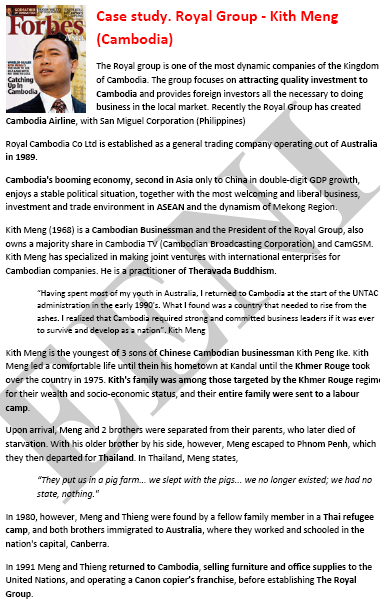

- Total value of import augmented by 21% (from 1.990 to 2,409 billion riels), compared to the same last year
- Total value of Cambodian export amount 1.045 million dollars, an augmented by 30.04% (from 804 million dollars, compared to same period last year) (Source: Customs and Excise Department)
- Top Cambodian exports products are garments, shoes, cigarettes, natural rubber, rice, pepper, wood, and fish
- Largest export markets of Cambodia are the U.S., Germany, the UK, Singapore, Japan, and Vietnam
- Top Cambodian imports are fuels, cigarettes, vehicles, consumer products, and machinery
- Top Cambodian import partners are Thailand, Singapore, China, Hong Kong, Vietnam, Taiwan, and the U.S.
- The Sihanoukville Autonomous Port is the only international seaport of the Kingdom of Cambodia
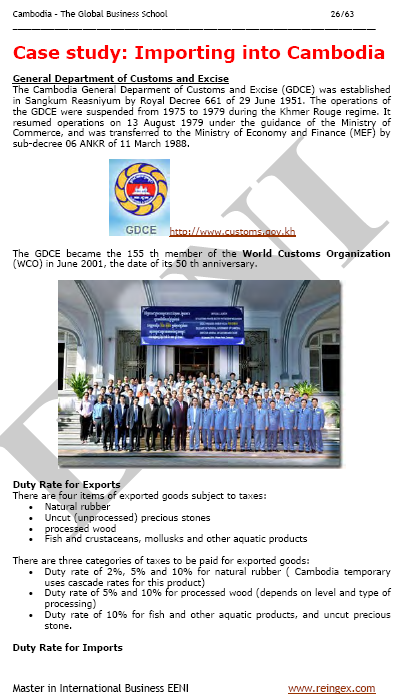
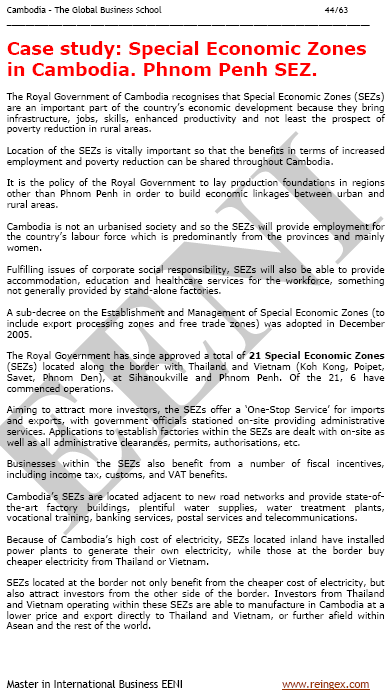
Foreign direct investment in Cambodia.
- The Kingdom of Cambodia has opened its economy to Foreign direct investment (FDI) in all the sectors of the economy (banking, insurance, or telecommunications)
- Foreign investors in Cambodia are allowed to control 100% of the shareholding, without the local participation requisite
- The largest foreign direct investment sources comes from Korea, China, Russia, Thailand, the U.S., and Vietnam
(c) EENI Global Business School (1995-2024)
We do not use cookies
Top of this page



